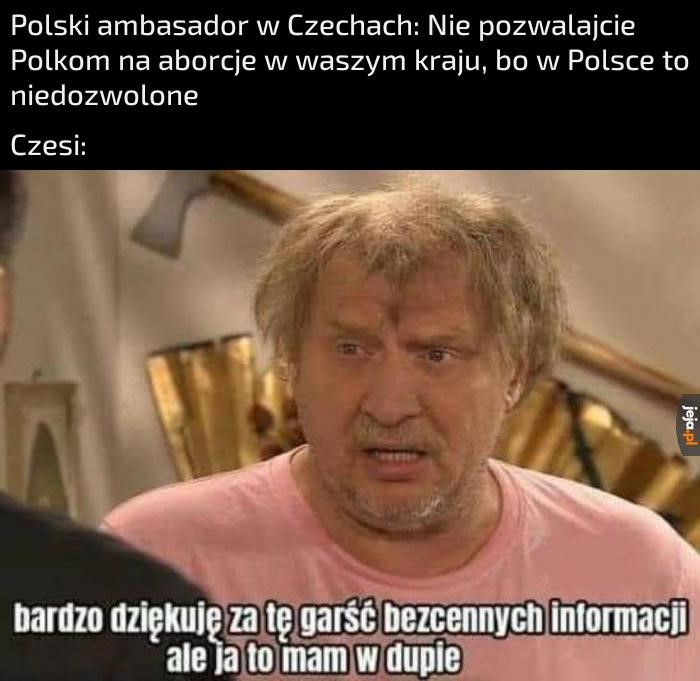The Polish embassy sent a letter to Czech officials demanding, that the Czech parliament does not pass a law clarifying that Polish women can obtain abortions in Czech Republic. In the March 2021 letter a Polish diplomat warned that passing such a law would be “unfortunate” for the Czech-Polish diplomatic relations, since the law would be “openly motivated by an intention to circumvent the Polish law, which protects the unborn human life” and that this propositions “are aimed at encouraging Polish citizens to break Polish law” (p.mal 2021).
The Polish abortion ban, tightened in January this year to exclude embryopathological indications, forces Polish women to travel for abortions, often to neighboring countries. The Czech Republic has long been one of those destinations, and the planned legislation is supposed to update the current 1986 law to adjust it to the new context of EU membership. The new law is only supposed to formalize an ongoing practice of providing medical care to Polish women in Czech Republic, but it still stimulated Polish officials to take a stand.
The voice of the Polish official might seem comic and it has, in fact, given rise to many a meme. The strangeness of this request to prevent women from having abortions in Czech hospitals stems from an elementary legal rule: jurisdiction. The law of a certain country only applies to this country’s territory. The desire of the Polish politicians to foil any woman’s attempt to escape the criminalization of abortion in Poland, even outside Poland’s territory, goes against the rule of jurisdiction. The officials are acting as if the Polish law could be binding even outside Poland. We might call this ambition, expansiveness or a bid for ultra-sovereignty.
Ultra-sovereignty is an effort to expand the binding force of certain laws beyond a country’s territory (by means other than international treaties), or at least to create an illusion of such power. This illusion, creating a perception among the Polish public, that abortion is illegal for Polish women everywhere, might prove crucial, as criminalization comprises of so much more than just the legal order. Public perception, popular understanding of rules, laws and their implementation, as well as the effects of stigmatization of a certain criminalized act or issue, all constitute the functioning social reality of criminalization.
The Polish official’s letter seems to be aimed at creating an illusion, however contrary to legal rules, that Polish women cannot find help anywhere, and cannot escape the Polish law. Legally, these claims are empty, but on the level of public perception, their role is to increase the impression of illegality, the unacceptability of abortion travel, and feelings of loneliness and helplessness. While legal debates will continue, the public understanding of the issue might only retain the vague information about the ambitions of the Polish state to stop Polish women from going abroad to terminate a pregnancy. On the other hand, the news brought about many satirical responses, including memes, showing the Polish embassy’s efforts as comic and delusional.

Source: Średnio Się Przejęli 2021; Polska to Oficjalnie Mem 2021

The increased visibility of abortion tourism (or abortion migration) is a new phenomenon in Polish abortion debate. I hypothesize it is a result of a new type of pro-abortion activism. New activist groups seem to adopt a strategy, in which organizing, facilitating and popularizing at-home pharmacological abortions and abortion tourism is prioritized over strategic litigation and facilitating legal abortions in Poland. These new activist groups choose to center the conditions and costs the abortion ban imposes on women, while directing public attention away from monstrous-fetal imagery of the anti-choice movement. Most of these groups were founded between 2016 and 2021 (e.g. Aborcyjny Dream Team, Ciocia Czesia), although some go back as far as 2006 (Kobiety w Sieci).
One of the results of this strategy is a dissemination of knowledge on how to safely circumvent the abortion ban. A recent interview in Newsweek reveals, that it was in fact one of such groups that initiated the legislative update that is being processed by the Czech parliament (Pawlicki 2021). Ciocia Czesia (“Auntie Czesia”) is a group of Polish women living in the Czech Republic, who facilitate contact between Polish women seeking abortions and two Czech clinics (one private, one public). Thanks to online crowdfunding, the group can also provide financial assistance to those who cannot afford the trip. Ciocia Basia activists point to other similar groups in Austria and Germany as inspiration and source of know-how (Ciocia Basia and Ciocia Wienia) (ibidem). An important part of this activism lies in its openness and the rejection of secrecy, a conscious effort to combat abortion stigmatization and fear around facilitation – crucial components of criminalization.
These developments demonstrate how criminalization of abortion is a constant negotiation and struggle between different actors (national states, citizens, clinics, public opinion) and that new, surprising strategies are being formulated to address it. Transgressing national borders seems to be a growing feature in the debates and practices around abortion criminalization.
- Pawlicki, Jacek. 2021. “To z Jej Powodu z Polskiego Dyplomaty Śmieją Się w Czechach. „Ciocia Czesia” Pomaga Polkom Zorganizować Aborcję Za Granicą.” Newsweek, May. https://www.newsweek.pl/swiat/aborcja-w-czechach-polki-pomagaja-polkom/ynqb794.
- p.mal. 2021. “Ambasada Do Władz Czech: Nie Ułatwiajcie Aborcji Polkom.” Rzeczpospolita, May 2, 2021. https://www.rp.pl/Dyplomacja/210509961-Ambasada-do-wladz-Czech-Nie-ulatwiajcie-aborcji-Polkom.html.
- Polska to Oficjalnie Mem. 2021. Mem. https://memy.jeja.pl/759450,polska-to-oficjalnie-mem.html.
- Średnio Się Przejęli. 2021. https://kwejk.pl/obrazek/3763313/srednio-sie-przejeli.html.
Article written by Dr. Agata Chełstowska.
